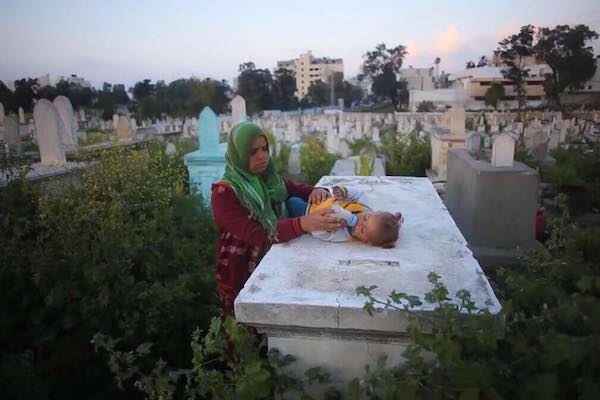I asked a man who lives among the graves in Gaza how he could bear to live among the dead. He challenged me. ‘How is living among the dead is worse than living among the living?’
By Mohammed Arafat

When I was a child, I used to pass by the Ma’madany [“Baptist”] graveyard in Gaza City with my dad whenever we went to the market. I always cried and held my father’s hand tightly because I had heard that people lived among the tombs. A frightening thought.
When I grew up, I was endlessly curious; I wanted to learn more about everything around me. But this graveyard remained shrouded in mystery — until a few days ago. When one of my neighbors died, I was hesitant to go to his funeral because I did not know him personally. Finally, I went. I walked in the procession along with hundreds of his relatives, and went to the graveyard, my old nightmare, to bury him. This was my first chance to find out if the story was true.
And it was. I trembled when I saw dozens of people camped out among dead, looking at us while we buried our friend. I wondered if we were the strangers — since we had invaded their “big house” — or whether they were, since they had left our world to live among the graves.
I left the crowd of people and gradually crept closer to those “strangers,” pretending to look for a grave of a relative. I got closer until I saw entire families living in small, makeshift homes made of tin plates. Children and their parents watched the funeral while playing games on and beside the gravestones spread among their homes.
I decided to strike up a conversation with one of the men by asking if he knew where to find my relative’s grave.
“Do you know where the Arafats’ graves are?” I asked a man whom I learned was Mohammed Khail, 34, after shaking his hand. He guided me to some of my relatives’ graves, with his little daughter following us.
“I was wondering why you guys are living here,” I said tentatively. “Did you lose your homes during the last war on Gaza?”
“I was born between the tombs,” he said.
His words shocked me. My heart started to beat fast.
“My parents were expelled from their village [in the land now called Israel] during the 1948 Nakba and they fled to Gaza,” he explained. “They hoped to find a home, but no one helped them.”
His parents found shelter in the cemetery, building a makeshift house from tin plates. But what was supposed to be temporary became permanent, as their poverty and the lack of resources in Gaza only deepened. Mohammed earns a few shekels a day driving residents around Gaza City in his horse-drawn cart.
“Over time, our home became too small as our family grew, so we built some more walls and enlarged it,” Mohammed explained. Today, he lives in the cemetery with 14 of his family members, including his parents, kids, brothers, sisters and in-laws.
Asked how he could bear living among the dead, Mohammed challenged me. “How is living among the dead is worse than living among the living? The people who breathe are why we are here. They haven’t helped us.”
I looked at his daughter, who I guessed was about 9 years old, and asked how she felt about living in a cemetery.
“It’s very cold. But we play here because we don’t have other places to go,” she said. The girl was shy to talk much but added, “Graves don’t scare us. We’re used to them.”
Her father interjected: “It’s very dangerous for the kids here. There are lots of stray dogs and big, nasty insects, rats, snakes and lizards. I just want to get out of this area to start a new life for my family.”
I called an official from the Palestinian Ministry of Awqaf [endowment] and Religious Affairs who refused to mention his name. He told me that he has urged the new unity government to find a solution for these people, “but I am sure there are no plans for them right now.” In fact, he admitted that in 2015, his ministry had asked municipal officials to impose restrictions on cemetery living so the cemetery can be better policed.
I left for home in a state of sadness, wondering whether the new government would help them find alternatives so they live more like humans. Or perhaps they will continue to be buried alive like they are now?
Mohammad Arafat, 25, is a graduate of the Islamic University of Gaza, where he studied English. He says he aspires to become “a voice for Palestine, expressing the people’s hopes and pains, helping them pursue their dreams in the face of adversity and demonstrating that every life matters.” A freelance writer, Mohammad already has self-published his own book, “Still Living There,” which he disseminates through Amazon. This post first appeared at We are Not Numbers. Read it here.

